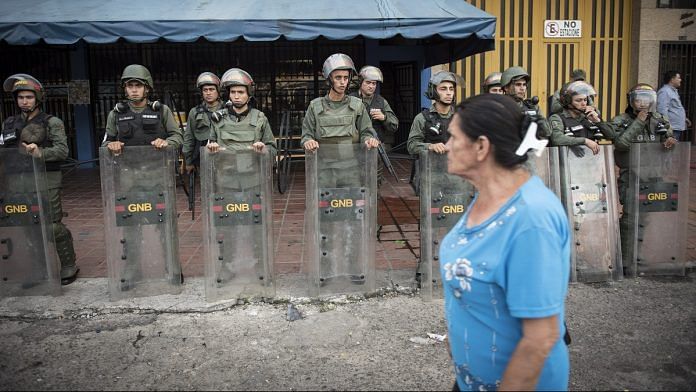In a rather unexpected turn of events, massive consignments of humanitarian aid have become critical to the future of Venezuela, facing a huge political and economic crisis.
Juan Guaido, who has declared himself as Venezuela’s interim president, promised his citizens that a “humanitarian avalanche”, comprising thousands of volunteers, will enter the country later Saturday. The aid, including food and medical supplies, has been accumulated across various checkpoints on the country’s borders with Brazil and Colombia.
ÚLTIMA HORA | Presidente Guaidó sorprende y aparece en el concierto de Venezuela Aid Live: Saluda al presidente de Colombia, Iván Duque https://t.co/osMCrM0dKp pic.twitter.com/AJwwdiQqe7
— AlbertoRodNews (@AlbertoRodNews) February 22, 2019
On Friday, a high-profile aid-concert was also organised at Cucuta, on the Colombia border, which featured several Latin American stars. British businessman Richard Branson organised the concert and the audience included American politician Marco Rubio. Guaido was given a massive welcome on his arrival at Cucuta.
As of now, Venezuelan armed forces have blocked these checkpoints by containers, restricting aid to enter the country.
The armed forces’ decision to allow or disallow this aid to enter Saturday could well decide the future of Venezuela.
In view of these events, ThePrint looks to explain the vital role of Venezuela’s army.
Also read: Venezuela represents the failure of the Left
#1: Back to the dictator’s playbook: The military
Two things sustain authoritarian regimes, patronage to a few and support of the military. This dictator’s playbook was seen playing out during the Arab Spring. Dictators who had the support of the military survived the rebellion.
Similarly, the Venezuelan military holds the key to its dictator, Nicolas Maduro’s future.
Maduro’s predecessor, Hugo Chavez, had purged the military to admit officials who were loyal and in line with his ideology. In addition, he gave them cabinet posts and access to banks to other financial services.
Maduro doubled down on that patronage. He gave top military leaders the control over key industrial sectors such as oil. Making them an accomplice in his crimes, he ensured if and when they fall, they would fall together.
Almost the entire high-ranking generals have publicly stated their loyalty for Maduro.
#2: American sanctions and the rise of Guaido
On 23 January, opposition leader and chairman of national assembly, Juan Guaido, declared himself as the interim president. Guaido is now recognized as the legitimate Venezuelan leader by the US, EU, and a host of Latin American countries.
Backing Guaido, the US under President Donald Trump finally unleashed crippling economic sanctions on Venezuela, targeting oil monopoly, PDVSA.
The US gulf region accounts for more than 50 per cent of Venezuela’s oil sales. Losing this market has caused Venezuela’s oil production to fall from 1.2 million barrels per day to just 1 million barrels.
In addition, Venezuela will also struggle to find Asian or European buyers. Transacting with PDVSA will ensure that these Asian or European companies will be cut off from the American financial system.
These moves have restricted Maduro’s ability to keep buying military’s loyalty.
Also read: In 14 charts: How Venezuela became a failed state
#3: Will the armed forces allow the aid to enter?
There are two possible scenarios.
There have been back-channel talks happening between the army and US officials. So if the Army allows the humanitarian aid to pass through the borders, it would most likely mean that regional commanders have been given some amnesty.
This in turn would mean that the top ranking officials are keeping their options open. Otherwise, it could lead to a future central-provincial army split.
The second scenario is that the army blocks these aid consignments from entering. But given the high-profile nature of this event, the army would earn a lot of disrepute domestically. Coupled with sanctions that are eroding government’s ability to buy the military, it could potentially mean some future defections within the military.
#4: Where does Venezuela go from here?
This is the key question. Most analysts today agree that it is only a matter of time before Maduro’s government falls.
The problem is that the military is seen as extremely corrupt and a party to Maduro’s crimes. So for it to rebel against their leader, the US would have to ensure a massive amnesty program.
Unless the top military brass is ensured post-rebellion security, it is highly unlikely that they will turn against Maduro.



